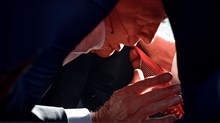
At Christian colleges across the country, incoming students pledge to comply with biblical standards for belief and behavior. This year, the appeals to love your neighbor and advance God’s mission have been applied to public health guidelines too, as schools ask students to promise to disinfect their dorm rooms, limit social interactions, and wear masks to class.
While all colleges reopening for in-person classes have issued new policies around the coronavirus, and several Ivy League institutions have similarly developed “social contracts,” the standard health precautions take on a spiritual significance at evangelical schools. The now-familiar instructions are framed by Christian values and lines from Scripture.
“We’re going to return in a way that Christians understand, but the secular world does not. We’re going to return in a covenant together,” Southern Baptist Theological Seminary president Al Mohler said in a video introducing the document to be signed by faculty, staff, and students returning to the Louisville, Kentucky, campus this week and next.
Most evangelical schools list the common coronavirus do’s and don’ts: handwashing, keeping a six-foot social distance, wearing masks in class and inside, and monitoring for symptoms. But unlike the straightforward recommendations coming from government officials or medical professionals, the colleges’ policies say that complying is a Christian obligation.
“This is more than just a great idea (for health and safety), it’s something that should resonate deep within us,” said Robert Taylor, dean of students at Dordt University. The topic will also come up in chapel sessions. “We think it’s a great opportunity and teachable moment to help our students develop a mindset of stewardship and creation care and loving their neighbor.”
In some cases, the spiritual and moral framing justify pandemic precautions that go beyond the norm.
At Messiah University and several others, community members are asked to do a daily “health check-in” to report their temperature to an app each morning, so school nurses can track symptoms and test before they spread. At Grove City College, students will use a contact tracing app that tracks anyone who’s been close to you for more than 15 minutes and notifies people of possible COVID-19 exposure.
In many cases, schools are explicitly requiring students to get a flu shot. A few reference the possibility of requiring a future vaccine for the virus.
In 20-plus evangelical college COVID-19 pledges reviewed by CT, the most common references were to love of neighbor and the importance of community. As some leaders pointed out, following the guidelines enables the schools to continue classes in-person.
A “pandemic promise” from Johnson University opened with the line: “Being part of the uncommon Johnson University community means that each of us will act in love toward one another by caring for one another, protecting one another, and taking care that our own actions do not harm others.”
“Our ability to remain on campus, living and learning TOGETHER, depends on YOU,” wrote Northwestern College in Iowa.
Certain evangelical schools tied the commitments directly to the mission of the institution. Southern notes that failure to comply, “can lead to the illness of others, risking lives and health and jeopardizing the ability… to fulfill our mission together on this campus and beyond.”
Grace College and Seminary referenced Hebrews 10:23 in a section about attitudes toward the pandemic: “I will remain hopeful and prayerful that these temporary methods will allow us to accomplish our longstanding mission and carry out our ways of Grace.”
At Gordon College in Massachusetts, though, administrators consulted with student leaders and decided to differentiate between its “community responsibility statement” and school’s foundational covenants (a faith statement and code of conduct).
“This statement is not intended to be the equivalent of a moral contract,” said spokesman Rick Sweeney. “It’s a commonsense commitment, and that framing was strongly advocated by the [student leadership] team.”
Administrators say students are excited to return to campus, but they also know how the changes and risks of illness may disrupt campus life.
The King’s College in New York City told students, “As we return to campus, we face an unprecedented semester where every member of our community must take extraordinary steps to stay healthy and continually sacrifice for the well-being of one another.” The statement cited Philippians 2:4: “Let each of you look not only to his own interests, but also to the interests of others” (ESV).
Trinity Evangelical Divinity School’s commitment references Romans 13:10 and 1 Corinthians 10:23–24 as Paul’s encouragement to “seek the good of others rather than simply seeking their own rights” and Romans 13:1 teaching to “submit to governing authorities.”
On some campuses, students will face strict social limitations, such as only eating alongside roommates or hallmates, who have been deemed a “campus family” and are exempt from social distancing requirements. Northwestern’s “Responsible Raider” pledge concludes with a promise to care for others by “noticing, encouraging, praying for and selflessly serving any member of my Raider family who needs support.”
Despite concerns that the pandemic would lead freshman to defer a year, many evangelical campuses aren’t going to feel empty this fall. Dordt and Milligan University told CT enrollment is at or above average, and Grace in Indiana is welcoming a record-breaking freshman class.
A majority of evangelical schools belonging to the Council for Christian Colleges and Universities are reopening for on-campus classes starting this month. But in late July, a number of California schools joined Fuller Theological Seminary in going online-only for the fall, due in part to the state requirements around in-person gatherings. Biola University, Pepperdine University, Azusa Pacific University, Point Loma Nazarene University, and Cal Baptist called off plans to return to campus.
Heading into the new semester, Christian colleges with plans to reopen have high expectations of their student body and campus community. Their safeguards are not optional or merely recommendations, but in many cases sent out with orientation materials as a requirement to learn and work on campus.
A New York Times op-ed published today critiqued colleges’ reopening plans that urge students to report their peers when they violate the rules. In contrast, Christian administrators are hopeful that drawing on their shared faith and existing sense of community will bolster their efforts.
The new pledges are not meant as a disciplinary threat—“not intended to be a punitive document,” said Sweeney at Gordon—but rather a reminder of the special obligations among brothers and sisters in Christ.
Yet, even sincere commitments to prayers and precautions cannot do away with the possibility of an outbreak. Covenants contain caveats about requirements changing as public health recommendations shift, and even disclaimers acknowledging the “personal risk” of participating in campus life.
“One of our concerns is that national news reports indicate students think returning to campus means a return to normalcy,” said Jennifer Johnson, chief communications officer for Johnson University, whose plan includes temporarily returning to remote instruction should an outbreak occur. “We have a good plan, but we are all going to have to diligently work together to be successful.”

Support Our Work
Subscribe to CT for less than $4.25/month


















